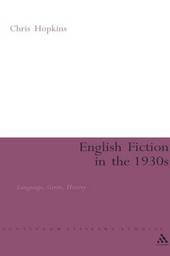
|
English Fiction in the 1930s: Language, Genre, History
Hardback
Main Details
Description
This study approaches the fiction of the 1930s through critical debates about genre, language and history, setting these in their original context, and discussing the generic forms most favoured by novelists at the time. Chris Hopkins uses a series of case studies of texts to draw on, develop or explore the boundaries, contemporary usefulness and complexities of particular prose genres. Generic debates and the political-aesthetic effects of different kinds of representation were live issues as discursive struggles and negotiations took place between modernist and realist modes, between high, middle and lowbrow categorisations of culture, between literature and mass culture, and between different conceptions of the role of the writer, politics and nationality, sexuality and gender identities. Chris Hopkins draws both on well-known texts and on novels which have only recently begun to be discussed by critics of the thirties - particularly those by women writers whose work has still not been related very clearly to the literary and political debates of the period. Organised in five sections each focusing on major genres, he takes a wide range of novels as case studies and discusses their uses of generic forms, relating them to other examples and to their historical, political and cultural contexts.
Author Biography
CHRIS HOPKINS is Professor of English Studies and Head of the Humanities Research Centre at Sheffield Hallam, UK.
Reviews"English Fiction in the 1930s not only provides new readings of texts that have been relatively or entirely ignored by critics, but suggests a series of productive and sometimes unexpected dialogues between texts. . . Hopkins's style throughout is lucid and whilst this study contributes to scholarship on the literature of the 1930s it does not presume an exhaustive specialist knowledge. . . The chapters [are all] perceptive, well-argued and suggestive. Hopkins's use of particular texts to explore the politics of genre opens the way for further research and an increasingly sophisticated understanding of 1930s literature. He is not the first to propose a more complex, diverse image of writing during the decade, but he offers a new perspective and a series of instructive new readings. English Fiction in the 1930s is consequently a valuable addition to a growing body of critical work that looks beyond the 'Auden generation." - Review of English Studies
|